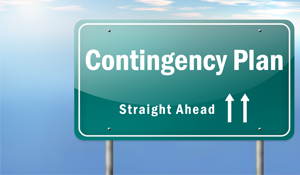What Will Happen to Your Business If You're Not There?
A contingency is the occurrence of a potential (or eventual) negative event in the future. The word contingency literally means “a future event or circumstance which is possible but cannot be predicted with certainty.”
As it relates to a business, contingencies would include the death or disability of an owner or key employee, economic recession, natural disaster, cyberattack, fraud—or, as we know all too well, a pandemic.
Having a business contingency plan that covers the death or disability of the owner will help ensure that their wishes/desires are fulfilled, protect their heirs from undue financial or emotional stress, protect their assets, and ensure timely access to their assets when needed.
In our recent article, Protect Your Wealth with Contingency Planning, we talked about why developing a business contingency plan for death and disability is critically important and how the business plan must dovetail with the business owner’s personal contingency plan.
Let’s discuss some key items that your personal and business contingency plans should include.
A strong Personal Contingency Plan should include, at a minimum:
- Location of all important documents.
- Names of advisors who can assist – financial, estate, insurance, etc.
- Insurance policy details.
- Passwords and access instructions for all financial, insurance, and social media accounts.
A strong Business Contingency Plan should, at a minimum:
- Detail the owner's goals and wishes for who will own the business in the future.
- Identify who should manage the business in the owner's absence.
- Names of advisors who can assist the family and employees.
- List of potential internal and/or external buyers if the company should be sold.
- Include all of the details for life insurance and disability policies.
- Detail other key, confidential information and assets including bank accounts, safety deposit boxes, and passwords to access your accounts.
- List the location of all important business documents.
- Reference an executed shareholder or “buy-sell agreement” if there is more than one owner.
- Determine who can access liquid assets in the event of an emergency.
Your spouse or key family member and ALL of your advisors should be aware of your contingency plans and should have copies in their files. All documents should be reviewed for changes annually just in case your situation changes. Do this as part of your year-end tax planning process.
Developing a contingency plan to be sure your business can operate without you will not only protect you, your family, and your business in the event that something happens to you, it will improve your company value if you decide to sell your business either internally or externally.
Every owner needs a contingency plan, regardless of age!
P.S. We also invite you to learn more about all of the business owner resources available to you at no cost at Business Transition Academy. Download a full PDF version of our book Cashing Out of Your Business – Your Last Great Deal ($17.95 value) for FREE and learn how to exit your business on your own terms and for the best price.
Material discussed in this communication is meant to provide general information and should not be acted on without obtaining professional advice tailored to you or your company’s individual and specific needs. Any tax advice contained in this communication (including any attachments) is not intended or written to be used, and cannot be used by any person or entity, for the purpose of (i) avoiding penalties that may be imposed on any taxpayer or (ii) promoting, marketing or recommending to another party any transaction or matter addressed herein. This information is for general guidance only and is not a substitute for professional advice. Information presented is believed to be factual and up-to-date; however, BTA makes no guarantee as to accuracy, completeness, suitability, or validity of any information within this communication and will not be liable for any errors, omissions, or delays in this information or any losses, injuries, or damages from its display or use. Any forward-looking statements are believed to be reasonable; however, BTA gives no assurance that such expectations will prove to be correct.




